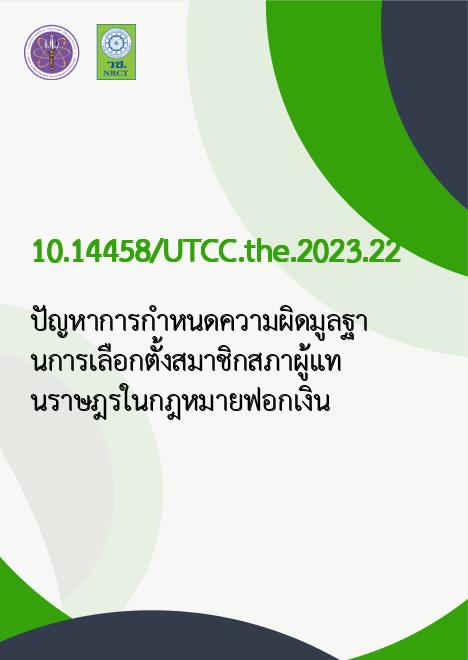
|
ปัญหาการกำหนดความผิดมูลฐานการเลือกตั้งสมาชิกสภาผู้แทนราษฎรในกฎหมายฟอกเงิน |
|---|---|
| รหัสดีโอไอ | |
| Title | ปัญหาการกำหนดความผิดมูลฐานการเลือกตั้งสมาชิกสภาผู้แทนราษฎรในกฎหมายฟอกเงิน |
| Creator | ภัทรวรรณ เปาอินทร์ |
| Publisher | University of the Thai Chamber of Commerce (UTCC) |
| Publication Year | 2566 |
| Keyword | การฟอกเงิน -- กฎหมายและระเบียบข้อบังคับ, สมาชิกสภาผู้แทนราษฎร -- การเลือกตั้ง, ความผิดทางการเมือง -- กฎหมายและระเบียบข้อบังคับ, กฎหมายเลือกตั้ง |
| Abstract | การกำหนดความผิดมูลฐานตามกฎหมายฟอกเงินไว้ในพระราชบัญญัติประกอบรัฐธรรมนูญว่าด้วยการเลือกตั้งสมาชิกสภาผู้แทนราษฎร พ.ศ.2561 มาตรา 73 (1) และ (2) ซึ่งเป็นความผิดเกี่ยวกับการจูงใจให้ผู้มีสิทธิเลือกตั้งลงคะแนนให้แก่ตนเองหรือผู้สมัครอื่นหรือที่ทราบกันทั่วไปว่าเป็นความผิดเกี่ยวกับการซื้อเสียง กล่าวคือ จัดทำ ให้ เสนอให้ สัญญาว่าจะให้ หรือจัดเตรียมเพื่อจะให้ทรัพย์สิน หรือผลประโยชน์อื่นใดอันอาจคำนวณเป็นเงินได้แก่ผู้ใด หรือ ให้ เสนอให้ หรือสัญญาว่าจะให้เงิน ทรัพย์สิน หรือประโยชน์อื่นใดไม่ว่าจะโดยตรงหรือโดยอ้อมแก่ชุมชน สมาคม มูลนิธิ วัด สถานศึกษา สถานสงเคราะห์ หรือสถาบันอื่นใด มากำหนดเป็นความผิดมูลฐานฟอกเงินนั้น ซึ่งตามพระราชบัญญัติประกอบรัฐธรรมนูญว่าด้วยการเลือกตั้งสมาชิกสภาผู้แทนราษฎร พ.ศ. 2561 มาตรา 158 ได้กำหนดโทษไว้ในอัตราสูงแล้ว การนำมากำหนดเป็นความผิดมูลฐานฟอกเงินด้วยนั้น อาจกลายเป็นปัญหาอาญาเฟ้อ (Over Criminalization) ทำให้เกิดสภาวะที่การกระทำต่าง ๆ เป็นความผิดอาญามากเกินความจำเป็นโดยไม่เกิดประโยชน์จากข้อหาหรือฐานความผิดที่ได้กำหนดไว้ การบัญญัติให้ความผิดเกี่ยวกับการเลือกตั้งดังกล่าวให้เป็นความผิดมูลฐานฟอกเงินด้วยนั้นไม่ได้คํานึงถึงสภาพความเป็นจริงของการบังคับใช้กฎหมายว่าจะสามารถนําตัวผู้กระทำความผิดตามกฎหมายที่บัญญัติขึ้นนั้นมาลงโทษได้จริงหรือไม่ เนื่องจาก ในทุกกรณีที่คณะกรรมการการเลือกตั้งได้มีคำวินิจฉัยให้ผู้กระทำความผิดตามพระราชบัญญัติประกอบรัฐธรรมนูญว่าด้วยการเลือกตั้งสมาชิกสภาผู้แทนราษฎร พ.ศ. 2561 มาตรา 73 (1) และ (2) คณะกรรมการการเลือกตั้งไม่สามารถดำเนินคดีกับผู้กระทำความผิดดังกล่าวในความผิดฐานฟอกเงินได้ นอกจากนี้ ยังเป็นเป็นการขัดต่อหลักความได้สัดส่วน (Principle of Proportionality) ขัดต่อหลักนิติธรรม (Rule of Law) และเป็นการขัดรัฐธรรมนูญแห่งราชอาณาจักรไทย พ.ศ. 2560 มาตรา 77 เนื่องจาก มีการกำหนดอัตราโทษในการกระทำความผิดเกี่ยวกับการเลือกตั้งเป็นความผิดมูลฐานการฟอกเงินนั้น เป็นการกำหนดโทษในทางอาญาที่มีอัตราโทษสูงไม่ได้สัดส่วนกับการกระทำความผิดและยังได้กำหนดอัตราโทษที่เป็นการซ้ำซ้อน การบัญญัติการกระทำความผิดตามพระราชบัญญัติประกอบรัฐธรรมนูญว่าด้วยการเลือกตั้งสมาชิกสภาผู้แทนราษฎร พ.ศ. 2561 มาตรา 73 (1) และ (2) ให้เป็นความผิดฐานฟอกเงินด้วยนั้น จึงทำให้เกิดความไม่ชัดเจนในการบังคับใช้กฎหมายดังกล่าว อีกทั้งไม่ได้เกิดประสิทธิภาพในการคุ้มครองสังคมและยังทำให้เกิดกฎหมายอาญาที่ไม่มีผลใช้บังคับได้จริง รวมทั้งโทษทางอาญาที่กำหนดไว้นั้นมีคุณประโยชน์น้อยกว่าภาระหรือต้นทุนที่ต้องสูญเสียไปในการทำให้กฎหมายนั้นเกิดผลดังที่ต้องการ นอกจากนี้ ตามพระราชบัญญัติป้องกันและปราบปรามการฟอกเงิน พ.ศ. 2542 มาตรา 3 มิได้ปรากฏบทบัญญัติให้ความผิดเกี่ยวกับการเลือกตั้งเป็นความผิดมูลฐานการฟอกเงินแต่อย่างใด แต่เป็นการบัญญัติไว้ในวรรคท้ายของพระราชบัญญัติประกอบรัฐธรรมนูญว่าด้วยการเลือกตั้งสมาชิกสภาผู้แทนราษฎร พ.ศ. 2561 มาตรา 73 โดยที่ความผิดตาม (1) หรือ (2) ให้ถือว่าเป็นความผิดมูลฐานตามกฎหมายว่าด้วยการป้องกันและปราบปรามการฟอกเงิน และให้คณะกรรมการมีอำนาจส่งเรื่องให้สำนักงานป้องกันและปราบปรามการฟอกเงินดำเนินการตามหน้าที่และอำนาจได้ || The Organic Act of Election of Member of the House of Representatives B.E. 2561 in Thailand designates predicate offenses, as outlined in Sections 73 (1) and (2) are predicate offenses under The Anti-Money Laundering Act. The provision of predicate offenses primarily pertains to vote-buying activities, involving acts, including inducing individuals to vote for certain candidates by offering, promising, or providing property or benefits to various entities, which could then be classified as predicate offenses for money laundering. Section 158 carries severe penalties and is also considered a money laundering offense, raising concerns about potential overcriminalization. The issue of over-criminalization, where certain actions are excessively criminalized, can lead to conditions in which the acts are more criminal than necessary without benefiting from the charges or bases of the offense that have been determined. And that provision does not take into account the reality of law enforcement whether the perpetrators of the offenses under the law can be punished because in all cases, the Election Commission has issued a decision to prosecute the offenders under the Organic Act of Election of Member of the House of Representatives B.E. 2561, Section 73 (1) and (2), the Election Commission can not prosecute the offenders for the offense of money laundering In addition, the offenses under Sections 73 (1) and (2) as predicate offenses of money laundering are disproportionate consequences and challenges related to enforcement, running counter to the principles of proportionality, the rule of law, and the Constitution of the Kingdom of Thailand B.E.2560 Section 77 because the penalty rate for election-related offenses is set as predicate offense of money laundering. The provision of offenses under the Organic Act of Election of Members of the House of Representatives B.E. 2561, Section 73 (1) and (2) also makes it an offense of money laundering, thus creating uncertainty in law enforcement. In addition, it is ineffective in protecting society and also causes a criminal law that is not enforceable. In addition, the prescribed criminal penalties are less beneficial than the burden or cost that must be lost in making the law work as desired. In addition, according to the Anti Money Laundering Act B.E. 2542, Section 3 does not contain provisions that election offenses are predicate offenses. Rather, it is stipulated in the last paragraph of the Organic Act of Election of Members of the House of Representatives B.E. 2561, Section 73, whereby the offenses under (1) or (2) shall be considered as predicate offenses of money laundering, and the Election Commissioners shall have the authority to refer the matter to the Anti-Money Laundering Office for further action. |
| URL Website | https://scholar.utcc.ac.th |
| Website title | UTCC Scholar |
